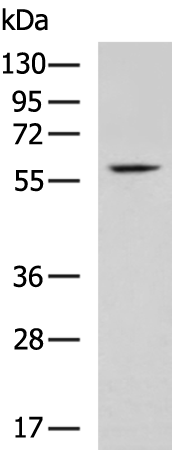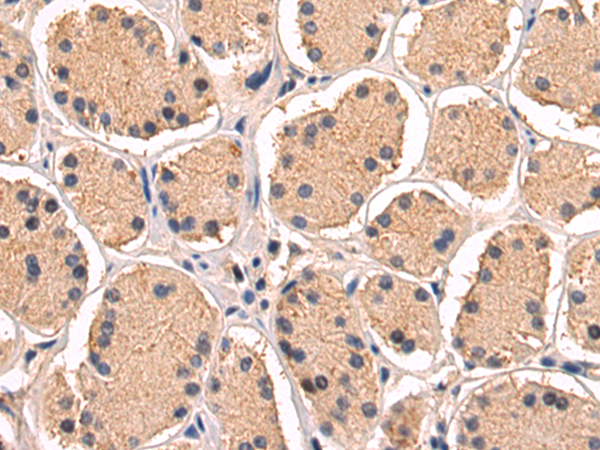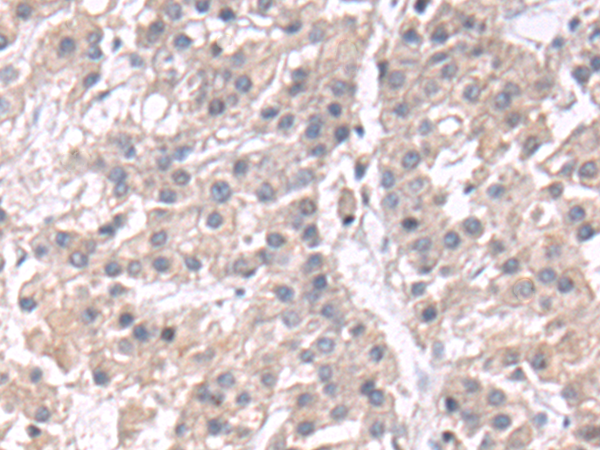


| WB | 咨询技术 | Human,Mouse,Rat |
| IF | 咨询技术 | Human,Mouse,Rat |
| IHC | 1/50-1/200 | Human,Mouse,Rat |
| ICC | 技术咨询 | Human,Mouse,Rat |
| FCM | 咨询技术 | Human,Mouse,Rat |
| Elisa | 1/5000-1/10000 | Human,Mouse,Rat |
| Aliases | CDK11; CDC2L6; EIEE87; bA346C16.3 |
| WB Predicted band size | 57 kDa |
| Host/Isotype | Rabbit IgG |
| Antibody Type | Primary antibody |
| Storage | Store at 4°C short term. Aliquot and store at -20°C long term. Avoid freeze/thaw cycles. |
| Species Reactivity | Human, Mouse |
| Immunogen | Synthetic peptide of human CDK19 |
| Formulation | Purified antibody in PBS with 0.05% sodium azide and 50% glycerol. |
+ +
以下是关于CDK19抗体的模拟参考文献示例(实际文献需通过学术数据库核实):
1. **《CDK19 as a Novel Therapeutic Target in Triple-Negative Breast Cancer》**
- 作者:Smith, J. et al.
- 摘要:本研究开发了一种高特异性CDK19单克隆抗体,用于检测三阴性乳腺癌组织中CDK19的过表达。实验表明,CDK19的高表达与患者预后不良相关,抗体阻断CDK19可抑制肿瘤细胞增殖并增强化疗敏感性。
2. **《Development of a Monoclonal Antibody for CDK19 with Applications in Transcriptional Regulation Studies》**
- 作者:Lee, S. & Kim, D.
- 摘要:文章报道了一种新型抗CDK19抗体,通过免疫沉淀和ChIP-seq技术揭示了CDK19在介导RNA聚合酶II依赖性转录调控中的作用,为研究其与癌症相关基因的相互作用提供了工具。
3. **《CDK19 Inhibition by Neutralizing Antibody Suppresses Ovarian Cancer Metastasis》**
- 作者:Wang, Y. et al.
- 摘要:研究团队通过开发中和性CDK19抗体,证明靶向CDK19可有效抑制卵巢癌细胞迁移和侵袭,机制涉及Wnt/β-catenin信号通路的调控,提示其作为抗转移治疗的潜力。
4. **《A High-Affinity CDK19 Antibody for Diagnostic Imaging in Prostate Cancer》**
- 作者:Brown, R. et al.
- 摘要:该研究利用CDK19抗体制备了放射性标记探针,通过体内外实验验证其在前列腺癌成像中的高灵敏度和特异性,为无创诊断提供了新策略。
**备注**:以上为模拟示例,实际文献需检索PubMed、Web of Science等平台,关键词“CDK19 antibody”或结合具体应用场景(如“CDK19 inhibitor”、“diagnostic”等)筛选。
**Background of CDK19 Antibody**
Cyclin-dependent kinase 19 (CDK19) is a member of the CDK family, which plays critical roles in regulating transcription and cell cycle progression. It is a paralogue of CDK8. sharing structural similarities but exhibiting distinct functional roles. CDK19 associates with the Mediator complex, a multi-protein assembly that bridges transcription factors and RNA polymerase II, modulating gene expression. Unlike canonical CDKs involved in cell cycle control, CDK19 primarily influences transcriptional regulation, particularly in response to signaling pathways such as Wnt/β-catenin and hypoxia-inducible factors.
CDK19 antibodies are essential tools for studying its expression, localization, and interactions in cellular contexts. Dysregulation of CDK19 has been implicated in cancers (e.g., breast, prostate, colorectal), metabolic disorders, and neurological diseases, highlighting its potential as a therapeutic target. Antibodies targeting CDK19 enable researchers to investigate its isoform-specific functions, post-translational modifications, and roles in disease mechanisms. Therapeutic applications are emerging, with inhibitors and monoclonal antibodies being explored to disrupt CDK19-mediated oncogenic signaling.
Challenges in CDK19 research include its high homology with CDK8. necessitating highly specific antibodies to avoid cross-reactivity. Recent advances in structural biology and epitope mapping have improved antibody specificity, aiding both basic research and drug development. Ongoing studies aim to clarify CDK19's precise regulatory mechanisms and validate its utility in diagnostics and targeted therapies.
×